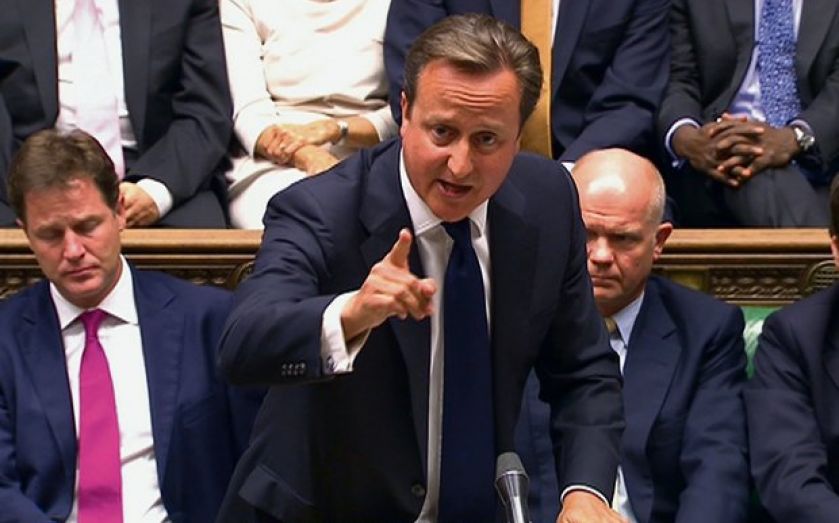Cameron calls off military action in Syria after losing Westminster vote

DAVID Cameron last night suffered a major blow to his authority as parliament took the near-unprecedented step of vetoing military action desired by the government.
Just 48 hours ago, the Prime Minister had hoped that last night’s vote would authorise immediate military strikes against the Syrian regime. Instead, Britain has now all but ruled out intervention in the country for the foreseeable future.
In a shock move, the House of Commons threw out the government’s motion, which proposed a strong response against the use of chemical weapons in Syria, including military action if necessary.
MPs were split down the middle, with 272 votes in favour and 285 against, with some Conservative and Liberal Democrat MPs voting against the government’s motion.
After the unexpected result was announced, Labour leader Ed Miliband called on the Prime Minister to assure the country that he would not use his executive powers to begin an attack without the approval of parliament.
Cameron replied: “It is clear to me that the British parliament, reflecting the views of the British people, does not want to see British military action. I get that and the government will act accordingly.”
Defence secretary Philip Hammond clarified immediately that, as a result of the vote, the UK would not play a part in military action on Syria, but that it would not affect the decisions of the US government: “They will be disappointed that Britain will not be involved. I don’t expect that the lack of British participation will stop any action.” He added: “It’s certainly going to place some strain on the special relationship”.
However, last night’s vote does not stop the UK providing support for potential US strikes against targets connected to the al-Assad regime.
“This has been a very good week for parliament,” Conservative MP Douglas Carswell told City A.M. last night. “It has asserted itself and made it quite clear that there will be no British military action in Syria”.
“For the first time in my adult life the House of Commons is starting to control government. Ministers were asked to make their case and they failed.”
Conservative education secretary Michael Gove was overheard shouting “you’re a disgrace” at rebel coalition MPs following the defeat.
MPs also comfortably rejected an amendment by Labour party leader Ed Miliband, calling for hard evidence both that chemical weapons had been used, and that the Syrian regime was responsible, before any military action could be approved.
Jim Fitzpatrick, Labour’s shadow minister of state of transport, resigned from the opposition front bench to oppose any military intervention in Syria whatsoever.
What Cameron had planned as a united response to a humanitarian crisis had descended into party-political bickering by Wednesday.
Yesterday afternoon, when the outcome of the vote was still thought to favour the government, a Downing Street spokesman went as far as accusing Labour of giving “succour to the regime” with their lukewarm backing for intervention.
Jim Murphy, Labour’s defence spokesman, said: “No one is interested in giving succour to the Assad regime. The government should apologise for that accusation”.
Cameron and deputy prime minister Nick Clegg were hoping to launch strikes on Syria this weekend following the vote. But Labour derailed the process by filing an amendment that called for the UN’s report – due out tomorrow – to be published before any decision was taken.
Despite Cameron insisting “this is not like Iraq” during the Commons debate, MPs from both sides said that the legacy of the controversial vote over the invasion of Iraq had a strong influence on the end result.
- Cameron will look back on this vote as a political blessing
- Strikes on Syria may force the West into a war it will struggle to control